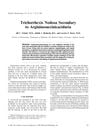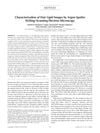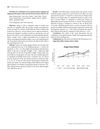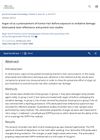 33 citations,
January 2007 in “Pediatric dermatology”
33 citations,
January 2007 in “Pediatric dermatology” Hair thinning and loss in a girl with a rare metabolic disorder was linked to her condition.
32 citations,
December 1965 in “The Lancet” Argininosuccinic aciduria can cause hair loss.
[object Object]  17 citations,
October 2016 in “Artificial Cells Nanomedicine and Biotechnology”
17 citations,
October 2016 in “Artificial Cells Nanomedicine and Biotechnology” Using tiny fat particles to deliver arginine to hair follicles could be a new way to treat hair loss.
14 citations,
June 2021 in “Journal of dermatological science” Argan press cake extract might help grow hair and protect hair cells from damage and inflammation.
 14 citations,
July 2001 in “American Journal of Human Genetics”
14 citations,
July 2001 in “American Journal of Human Genetics” Haplogroup X found in Altaian population supports Amerindian origin.
 12 citations,
February 2006 in “Lipids”
12 citations,
February 2006 in “Lipids” Hair texture changes with age due to varying levels of lipids.
10 citations,
May 1974 in “American journal of diseases of children” The girl had a rare disorder causing mental and physical symptoms, with weak hair and unclear neurological issues.
 7 citations,
June 2021 in “Amino acids”
7 citations,
June 2021 in “Amino acids” Human hair protein modifications could potentially indicate heart disease risk.
 7 citations,
January 2013 in “Journal of Cosmetics, Dermatological Sciences and Applications”
7 citations,
January 2013 in “Journal of Cosmetics, Dermatological Sciences and Applications” Argan oil and cupuassu butter can protect hair after dyeing.
[object Object]  5 citations,
May 2022 in “Fashion and Textiles”
5 citations,
May 2022 in “Fashion and Textiles” Hair conditioners with argan oil or camellia oil improve the strength and color of bleached hair.
5 citations,
April 2013 in “Journal of Cosmetic and Laser Therapy” Argireline significantly reduces wrinkles.
 2 citations,
July 2022 in “PubMed”
2 citations,
July 2022 in “PubMed” Coconut oil helps with brittle hair and infestations, castor oil may improve hair shine, and argan oil lacks evidence for hair benefits.
 1 citations,
July 2022 in “Clinical and Experimental Dermatology”
1 citations,
July 2022 in “Clinical and Experimental Dermatology” Amino acid supplements may not be necessary for all women with chronic hair loss.
 1 citations,
February 2022 in “Biological Trace Element Research”
1 citations,
February 2022 in “Biological Trace Element Research” The combination of Arginine Silicate Inositol Complex and a new form of Biotin improved hair and nail growth in rats.
 1 citations,
June 2019 in “Current developments in nutrition”
1 citations,
June 2019 in “Current developments in nutrition” A combination of arginine silicate complex and magnesium biotinate improves hair and nail growth in rats.
 September 2018 in “Cosmetics”
September 2018 in “Cosmetics” Inositol and arginine solutions improve hair follicle health and turnover.
 April 2024 in “Cosmetics”
April 2024 in “Cosmetics” Different oils affect hair flexibility and strength, with their impact varying on whether hair is virgin or bleached.

Problems with arginine processing in hair follicles might contribute to common hair loss, and arginine supplements could help treat it.
 June 2023 in “Italian journal of dermatology and venereology”
June 2023 in “Italian journal of dermatology and venereology” The oral supplement improved hair loss in patients with telogen effluvium.
 September 2022 in “KnE medicine”
September 2022 in “KnE medicine” Argan oil in hair tonic increases hair growth and weight in mice, with the best results at 3% concentration.
September 2022 in “Zenodo (CERN European Organization for Nuclear Research)” Argan oil is good for hair and skin and can be applied directly.
September 2022 in “Zenodo (CERN European Organization for Nuclear Research)” Argan oil is beneficial for hair and skin and can be applied directly.
 August 2022 in “Clinical and Experimental Dermatology”
August 2022 in “Clinical and Experimental Dermatology” Amino acid supplements may not be necessary for all women with chronic hair loss.
June 2022 in “WORLD SCIENTIFIC eBooks” Amazigh women in Morocco have lost control of argan oil production to the state and businessmen, limiting their roles to nut cracking.
 February 2022 in “Journal of Cosmetic Dermatology”
February 2022 in “Journal of Cosmetic Dermatology” Argan oil protects hair from oxidative damage and reduces protein loss.
 January 2022 in “Przegla̧d dermatologiczny”
January 2022 in “Przegla̧d dermatologiczny” A man with a mental disorder turned his skin blue-gray by drinking silver to treat warts.
 December 2015 in “Biomedical and biopharmaceutical research”
December 2015 in “Biomedical and biopharmaceutical research” Argan oil makes hair care products spread better and improves their texture.
March 1999 in “Hair transplant forum international”  36 citations,
March 2014 in “Biomaterials”
36 citations,
March 2014 in “Biomaterials” A new skin-whitening agent using a peptide from wheat is safe and effective at reducing skin pigmentation.
3 citations,
January 2022 in “Journal of neuroendocrinology” Sex hormones affect brain cells differently in males and females.





















